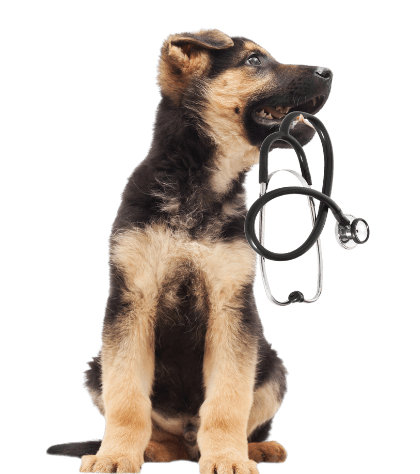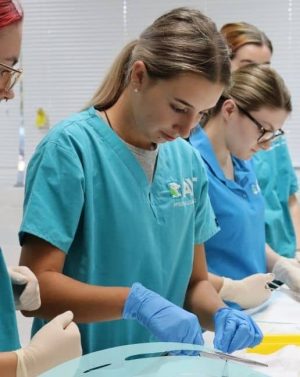
Our goal is to see students succeed in their animal care career path and to ensure we provide the veterinary industry with high quality, employable graduates. There are two factors we consider when assessing applications for our courses.
Firstly, applicants are required to meet the Compulsory Prerequisite outlined by ASQA (Australian Government) . Secondly we review each applicant based on a combination of individual experience, education, ability and suitability to work with animals. We often refer to this as the AVT Selection Criteria. Learn more about this below.
As outlined by Australian Skills Quality Authority (ASQA), to enrol in ACM40418 Certificate IV in Veterinary Nursing, you will be required to have either:
You have a Certificate II in Animal Care (Animal Studies);
OR
You have a relevant Certificate III or higher level qualification in an animal science discipline;
OR
You can demonstrate equivalent skills and knowledge in a relevant animal science discipline gained via workplace experience. Learn more below and Complete a Prerequisite Application Form to get started.
Assessing whether or not you meet the prerequisite for ACM40418 Certificate IV in Vet Nursing is done by a personalised review of each and every applicant. If you feel you don’t meet the prerequisite, we can assist you with one of our unique pathways such as our Vet Nurse Pathway Course that will fast-track your application so you can get started as soon as possible. Simply contact us for more information.
Our graduates are sought after by Veterinary Practices throughout Australia. One of the reasons for this is our selection process. Therefore places in the AVT Veterinary Nursing course are highly competitive and limited. This also means applicants are subject to our normal selection process. This involves considering your aptitude for working in the animal care industry. If you are currently employed in a veterinary practice and have the support of your employer to study this qualification, this will be considered favourably.
When selecting students, we also consider two other important criteria as outlined below.
We look for evidence of your ability to study at the Certificate IV level. This may be based on your completion of school or other studies. We do not apply strict rules on what schooling you need to have completed and all students can present evidence of their ability to show equivalency to this level.
It is recommended that you have completed or have equivalent language, literacy and numeracy at a year 12 high school level. Throughout this course, you will be required to read and interpret workplace policy and procedures, technical and medical terminology, perform moderate level calculations and exercise various forms of workplace communications.
For students that do not have evidence of previous studies we may ask you to complete one of our own aptitude assessments that may allow you to demonstrate your ability. These assessments are designed to assess your language, literacy and numeracy skills. We may ask you to take some further background studies if we feel you need extra study experience.
Veterinary nursing can be both a physically and emotionally challenging job at times and requires you to have a certain amount of resilience and maturity due to the nature of the veterinary industry and the type of situations that you will face.
A veterinary nurse’s role involves as much interaction with people as it does with animals. This means excellent communication and customer service abilities are essential. Good interpersonal skills are required to be able to interact with and convey information to clients and other members of the hospital team.
Our selection process will take into consideration the quality of your application as well as how you perform during a formal interview, either face to face, Zoom, Teams or via telephone (if your application reaches this stage). Behavioural, cognitive and interpersonal assessments are used to help us with our selection.
As mentioned above, places are highly competitive and limited.
We’ve put together a few tips on how to submit your application for the ACM40418 Certificate IV in Veterinary Nursing at AVT.
Unfortunately a non-animal science based university or college qualification does not meet the prerequisite for this course. You will need to show evidence of knowledge in animal care or animal studies.
Examples of tertiary qualifications that will NOT meet the prerequisite include:
Please refer to our the FAQ ‘What other animal science related qualifications are relevant and are deemed equivalent to the Certificate II in Animal Care?‘ for qualifications that do qualify for recognition.
AVT recognised animal care qualifications that qualify for exemption.
The following nationally recognised qualifications are examples of related qualifications that can be deemed equivalent:
Other qualifications may be relevant, although must be a Certificate III or a higher level qualification and will include those where you can demonstrate you have gained experience in all of the following five areas:
As a guide, examples of other qualifications involving animals that may meet equivalency include commencement or completion of degrees in areas such as:
If you cannot provide sufficient evidence to prove you meet the prerequisites, we will then work with you to establish a pathway for entry into the course.
If you have completed an alternative qualification that may be equivalent to the prerequisite, you will need to submit formal qualification documents including a certificate and results listing all units studied such as a Statement of Attainment (note these are not required if your qualification was gained from AVT).
If you believe you have relevant knowledge and skills as a result of workplace experience – you will be required to provide information about previous experience. See our separate FAQ on ‘What evidence do you need of my workplace related skills and knowledge?’.
If you have successfully completed the ACM20121 Certificate in Animal Care or a directly equivalent qualification you can complete the full application form. Here’s a few things you will be asked about:
You will be required to complete an online application form to apply for the ACM40418 Certificate IV in Veterinary Nursing course. This form includes questions about your previous knowledge and skills as well as other qualifications you have completed.
Meeting the compulsory prerequisite or equivalency does not guarantee entry into AVT’s ACM40418 Certificate IV in Veterinary Nursing course. Once prerequisites have been met, prospective students may then apply for entry in to the course and are subject to the course selection criteria as described here.
There are many online training providers offering “Certified” courses in animal care such as the Vet Assistant Certificate, Advanced Certificate in Veterinary Assistant and Animal Welfare, Dog Grooming Certificate, Equine Studies Certificate, Cat Care and Training Certificate, Animal Welfare Certificate and many others. Generally, these online courses are not accredited and therefore not nationally recognised by the Australian Government.
Only nationally accredited certificates offered by Registered Training Organisations (RTOs) meet the prerequisite for Veterinary Nursing. RTOs are regulated and audited by the Australian Skills Quality Authority or the relevant State regulator to ensure the course content meets certification standards and the provider complies with the legislation required to deliver the VET Quality Framework. The best way to find a nationally accredited organisation offering nationally accredited courses is to search training.gov.au. Also, as a general rule, animal care related courses, commence with a code starting with ACM e.g. ACM20121 Certificate II in Animal Care
There are a number of online trainer providers providing animal care related courses that are not RTO’s and therefore their courses do not meet the prerequisite for ACM40418 Certificate IV in Veterinary Nursing. Many of these courses are theory based and do not require you to obtain practical skills or have contact with animals which is essential for the prerequisite. If you are considering a course in an animal care related area, we highly recommend choosing an accredited course. This ensures your certificate will be recognised by a future employer and you can continue your study pathway to veterinary nursing or another area of study.
For more information about the prerequisite and entry requirements for veterinary nursing visit: Selection Criteria and Entry into Veterinary Nursing
If your skills and knowledge are deemed equivalent, this does not mean you will be awarded a Certificate II in Animal Care/Studies. Nor does it guarantee you entry into this course. AVT normal selection criteria applies for all courses.
Examples of animal care related workplaces where you will need to demonstrate at least a minimum of 1 years’ experience include:
Unfortunately, caring for your own pets at home or hobbies and interests with animals is not adequate experience.
Equivalency of the prerequisite qualification, Certificate II in Animal Care/Studies may include relevant employed or voluntary (work experience) positions in a range of animal care facilities.
You will be asked to demonstrate equivalent skills and knowledge in the following five areas:
Here’s some examples of tasks you may have performed whilst working in an animal care facility:
In order for us to ascertain whether you meet the entry requirement as a result of knowledge and skills you have gained in the workplace, you need to provide evidence which is relevant and current and may include:
We may or may not also need to carry out verbal or written testing of certain subjects/units to help us with the assessment of your application for exemption from completing a Certificate II in Animal Studies/Animal Care (fees may apply).
Places are offered to online students based on the availability of a Veterinary Practice to support your training. If you are not based in WA and not employed in a practice, you are required to locate a practice willing to support you. For prospective students we have developed a workplace kit to assist you.
If we are not able to offer you a place at the time of your application, we will advise you on a plan for the future. This may include an education pathway such as qualifications in animal care or seeking work experience.

The leader in delivery of Australian Nationally Recognised Qualifications including ACM20121 Certificate II in Animal Care (formerly Animal Studies), ACM30122 Certificate III in Animal Care Services, ACM40818 Certificate IV in Veterinary Nursing and ACM40322 Certificate IV in Animal Behaviour and Training.
Applied Vocational Training (AVT) delivers a range of qualifications and short courses for students wishing to pursue a career working with animals.
AVT is a Registered Training Organisation based in Perth, Western Australia, providing on-campus and online courses to students studying throughout Australia. More about us →
We acknowledge the traditional owners of the land where our campus is based, the Whadjuk people of the Noongar Nation. We pay our respects to Elders past, present and emerging and we commit to walking alongside our indigenous brothers and sisters. We extend that respect to the Aboriginal and Torres Strait Islanders in our community.
Applied Vocational Training (AVT) is proudly a Registered Training Organisation (RTO 5273).